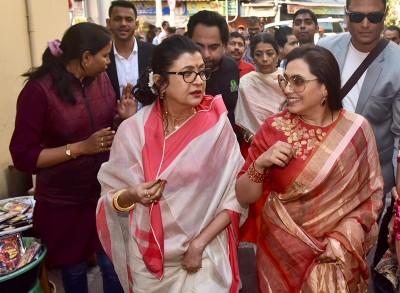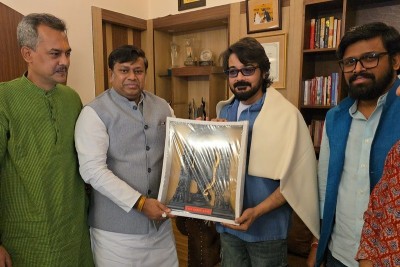
New Bollywood film about rural innovator spotlights menstrual health, women's rights
New York/Mumbai, Feb 9 (JEN): Bollywood is highlighting the issue of menstrual hygiene in a new comedy-drama that aims to break taboos around sanitary pads.
Pad Man is inspired by a rural welder in southern India, Arunachalam Muruganantham, who devoted 20 years of his life to creating a machine which made low-cost sanitary pads.
He was inspired to create an inexpensive pad after seeing his wife use rags during her monthly cycle, just like 88 per cent of the females in India who do not have access to sanitary products.
The lack of access to proper hygiene was also what inspired the film's producer, Twinkle Khanna, who encountered 'period poverty' while in boarding school. Ms. Khanna adapted the film from a short story she had written, “The Sanitary Man of Sacred Land.”
Ahead of the film's opening on 9 February in theatres worldwide, UN News spoke to Ms. Khanna about menstrual health and the taboos which surround it, not only in India, but in all countries.
“It's just a natural part of our biology. In fact, it's the most important part of our biology because without that, our species would be extinct,” Ms. Khanna said.
Muruganantham's mini-machines, which can manufacture sanitary pads for less than one-third of the cost of commercial pads, are now installed in at least 23 of India's 29 states.
The man who was once ostracized by his family and community, who felt embarrassed by his obsession with menstruation, has been honoured by the Indian Government and the international community – including the United Nations.
He is also an advocate for women's health, a global issue entwined in the Sustainable Development Goals (SDGs), the global development adopted by UN Member States, in 2015, that aims to protect the planet and ensure prosperity for all people.
Girls without access to sanitary napkins rely on unhygienic substances, such as sand, sawdust, leaves and even ash, which can lead to reproductive diseases and potentially impact maternal mortality.
“This real story was one of the breakthrough inventions that I came across while serving as the World Health Organization's representative in India from 2010 to 2015,” said Nata Menabde, Executive Director of the WHO Office in New York.
She noted that substantial numbers of girls in many developing countries have knowledge gaps and misconceptions about menstruation, as well as lacking access to basic menstrual hygiene products.
“This causes anxiety, fatigue and keeps them from participating in social activities and going to school,” said Menabde. “Taboos and stigma attached to menstruation further hinders the situation by reducing their self-esteem.”
Muruganantham, as he is known, encountered these taboos himself when trying to recruit college girls to test his sanitary napkins. He then used an old soccer-ball bladder filled with goat blood around his hips to test his sanitary pads.
“This film highlights the importance of universal access to sanitary products, privacy, running water, toilets and disposal facilities, which are all imperative in eliminating stigma and allowing girls to take control over their lives,” Menabde said.
“The film also underscores the importance of simple and low-cost inventions that could bring powerful solutions to improve human lives,” added the WHO official.
Courtesy of Pad Man
Support Our Journalism
We cannot do without you.. your contribution supports unbiased journalism
IBNS is not driven by any ism- not wokeism, not racism, not skewed secularism, not hyper right-wing or left liberal ideals, nor by any hardline religious beliefs or hyper nationalism. We want to serve you good old objective news, as they are. We do not judge or preach. We let people decide for themselves. We only try to present factual and well-sourced news.







